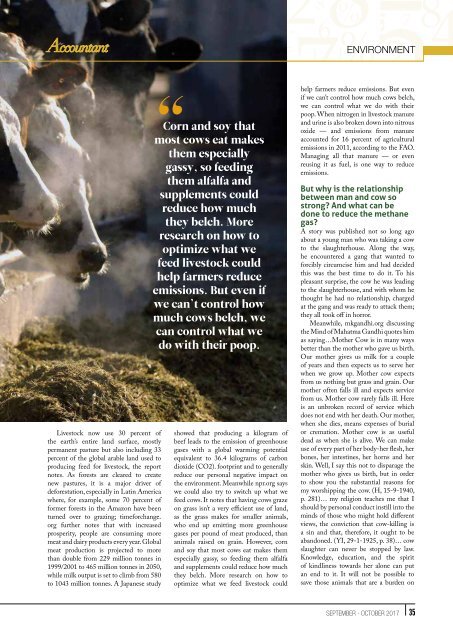The-Accountant-Sep-Oct-2017-Final
You also want an ePaper? Increase the reach of your titles
YUMPU automatically turns print PDFs into web optimized ePapers that Google loves.
Environment<br />
Livestock now use 30 percent of<br />
the earth’s entire land surface, mostly<br />
permanent pasture but also including 33<br />
percent of the global arable land used to<br />
producing feed for livestock, the report<br />
notes. As forests are cleared to create<br />
new pastures, it is a major driver of<br />
deforestation, especially in Latin America<br />
where, for example, some 70 percent of<br />
former forests in the Amazon have been<br />
turned over to grazing; timeforchange.<br />
org further notes that with increased<br />
prosperity, people are consuming more<br />
meat and dairy products every year. Global<br />
meat production is projected to more<br />
than double from 229 million tonnes in<br />
1999/2001 to 465 million tonnes in 2050,<br />
while milk output is set to climb from 580<br />
to 1043 million tonnes. A Japanese study<br />
Corn and soy that<br />
most cows eat makes<br />
them especially<br />
gassy, so feeding<br />
them alfalfa and<br />
supplements could<br />
reduce how much<br />
they belch. More<br />
research on how to<br />
optimize what we<br />
feed livestock could<br />
help farmers reduce<br />
emissions. But even if<br />
we can’t control how<br />
much cows belch, we<br />
can control what we<br />
do with their poop.<br />
showed that producing a kilogram of<br />
beef leads to the emission of greenhouse<br />
gases with a global warming potential<br />
equivalent to 36.4 kilograms of carbon<br />
dioxide (CO2). footprint and to generally<br />
reduce our personal negative impact on<br />
the environment. Meanwhile npr.org says<br />
we could also try to switch up what we<br />
feed cows. It notes that having cows graze<br />
on grass isn’t a very efficient use of land,<br />
as the grass makes for smaller animals,<br />
who end up emitting more greenhouse<br />
gases per pound of meat produced, than<br />
animals raised on grain. However, corn<br />
and soy that most cows eat makes them<br />
especially gassy, so feeding them alfalfa<br />
and supplements could reduce how much<br />
they belch. More research on how to<br />
optimize what we feed livestock could<br />
help farmers reduce emissions. But even<br />
if we can’t control how much cows belch,<br />
we can control what we do with their<br />
poop. When nitrogen in livestock manure<br />
and urine is also broken down into nitrous<br />
oxide — and emissions from manure<br />
accounted for 16 percent of agricultural<br />
emissions in 2011, according to the FAO.<br />
Managing all that manure — or even<br />
reusing it as fuel, is one way to reduce<br />
emissions.<br />
But why is the relationship<br />
between man and cow so<br />
strong? And what can be<br />
done to reduce the methane<br />
gas?<br />
A story was published not so long ago<br />
about a young man who was taking a cow<br />
to the slaughterhouse. Along the way,<br />
he encountered a gang that wanted to<br />
forcibly circumcise him and had decided<br />
this was the best time to do it. To his<br />
pleasant surprise, the cow he was leading<br />
to the slaughterhouse, and with whom he<br />
thought he had no relationship, charged<br />
at the gang and was ready to attack them;<br />
they all took off in horror.<br />
Meanwhile, mkgandhi.org discussing<br />
the Mind of Mahatma Gandhi quotes him<br />
as saying…Mother Cow is in many ways<br />
better than the mother who gave us birth.<br />
Our mother gives us milk for a couple<br />
of years and then expects us to serve her<br />
when we grow up. Mother cow expects<br />
from us nothing but grass and grain. Our<br />
mother often falls ill and expects service<br />
from us. Mother cow rarely falls ill. Here<br />
is an unbroken record of service which<br />
does not end with her death. Our mother,<br />
when she dies, means expenses of burial<br />
or cremation. Mother cow is as useful<br />
dead as when she is alive. We can make<br />
use of every part of her body-her flesh, her<br />
bones, her intestines, her horns and her<br />
skin. Well, I say this not to disparage the<br />
mother who gives us birth, but in order<br />
to show you the substantial reasons for<br />
my worshipping the cow. (H, 15-9-1940,<br />
p. 281)… my religion teaches me that I<br />
should by personal conduct instill into the<br />
minds of those who might hold different<br />
views, the conviction that cow-killing is<br />
a sin and that, therefore, it ought to be<br />
abandoned. (YI, 29-1-1925, p. 38)… cow<br />
slaughter can never be stopped by law.<br />
Knowledge, education, and the spirit<br />
of kindliness towards her alone can put<br />
an end to it. It will not be possible to<br />
save those animals that are a burden on<br />
september - october <strong>2017</strong> 35

















